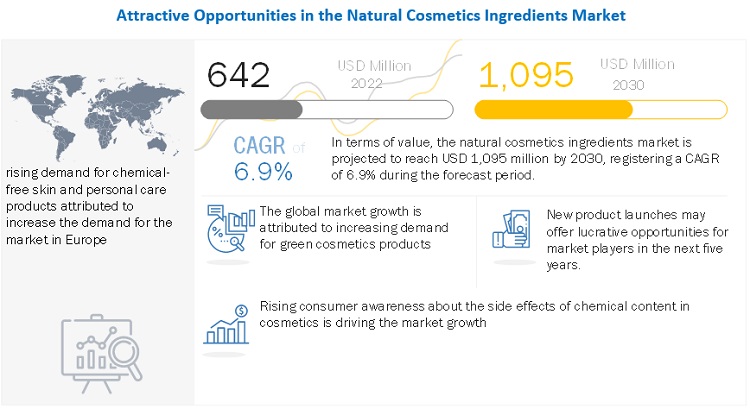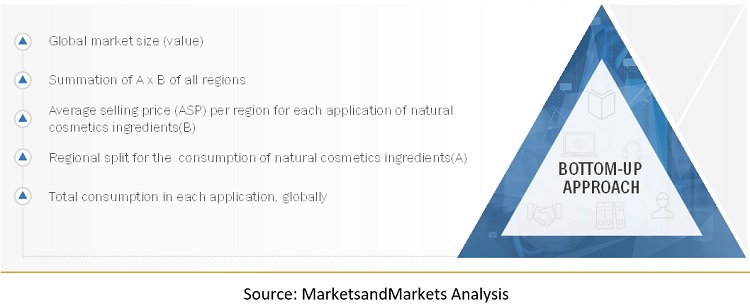Natural Cosmetics Ingredients Market by Ingredient Type (Emollients, Bio Surfactants, Sugar Polymers, Natural Preservatives, Others), Application (Skin Care, Hair Care, Oral Care, Make-up) and Region - Global Forecast to 2030
Updated on : April 01, 2024
Natural Cosmetics Ingredients Market
The global natural cosmetics ingredients market was valued at USD 642 million in 2022 and is projected to reach USD 1,095 million by 2030, growing at 6.9% cagr from 2022 to 2030. The demand for beauty goods is expected to rise, and environmental awareness is likely to increase along with it. Natural goods are increasingly being introduced by manufacturers as a result of growing customer awareness of the negative consequences of cosmetics' chemical content.

To know about the assumptions considered for the study, Request for Free Sample Report
Market Dynamics
Driver: Growing awareness chemical-free personal care products
The natural cosmetics ingredients market has expanded as a result of increased customer demand for skin and personal care products free of chemicals and shifting consumer attitudes toward organic care. Over the past several years, the rise of this sector has also been aided by rising disposable incomes and shifting lifestyles. Over the course of the projection, this tendency is anticipated to persist.
Restraints: Limited shelf life as compared to traditional cosmetic ingredients
Commercial cosmetic products now require synthetic preservatives since water-based products with all-natural preservatives have a relatively short shelf life. A product's shelf life can be increased by six months or less by manufacturers that use natural preservatives. However, exposure to air and water can cause oxidation and other types of degeneration that render natural preservatives useless.
Opportunities: Rising awareness towards consumer health
Increased use over the past several years can be linked to growing consumer knowledge of the advantages of natural cosmetic products on consumer health and reduced environmental impact. Consumption of natural personal goods has risen as a result of the rising trend toward consuming fewer dangerous chemicals, such as phthalates, aluminium salts, and parabens, as well as the persistent attempts of multinational firms to employ sustainable products.
Challenges: Lack of proper regulations towards natural ingredients
The FDA sets standards for the permissible use of preservatives in various natural cosmetic products. However, many companies that produce natural products find it challenging to locate natural substances that can be used in industrial quantities as an alternative to synthetic preservatives. In the cosmetics sector, the lack of specific legislation on the subject and the discrepancy between private norms and institutional perceptions of natural cosmetics causes insecurity.
“Skin care was the largest application for natural cosmetics ingredients market in 2021, in terms of value”
The skin care segment accounted for the largest market share, in terms of value, in 2021. The segment is anticipated to develop strongly over the next several years. Sales of skincare products have surged in nations that are rapidly expanding as a result of shifting consumer spending patterns and an increase in personal care items. Additionally, the market's expansion is impacted by the clean label products' rising popularity.
“Emollients was the largest ingredient type for natural cosmetics ingredients market in 2021, in terms of value”
The emollients market accounted for the largest share in terms of both value and volume in 2021. This is because emollients are widely used in almost every application such as skin care, ranging from face creams to skin cleansers and scrubs; and in hair care products such as shampoos and conditioners.
“Europe was the largest market for natural cosmetics ingredients in 2021, in terms of value.”
In 2021, Europe accounted for the biggest market share, of global natural cosmetics ingredients market, in terms of valu,. The majority of the leading companies and a rising number of start-ups producing natural cosmetics are located in Europe. Over the course of the forecast period, key players including L'Oréal SA, AVON Product Inc., and Bioeffect are expected to support Europe in maintaining its leadership position.

To know about the assumptions considered for the study, download the pdf brochure
Key Market Players
The key players in this market BASF SE (Germany), Dow Inc (US), Solvay (Belgium), Evonik Industries AG (Germany), Clariant AG (Switzerland), Ashland Global Holdings Inc. (US) and Croda International PLC.(UK) Continuous developments in the market—including new product launches, mergers & acquisitions, agreements, and expansions—are expected to help the market grow. Leading manufacturers of natural cosmetics ingredients market have opted for new product launches to sustain their market position.
Please visit 360Quadrants to see the vendor listing of Top 20 Personal Care Ingredients Companies, Worldwide 2023
Natural Cosmetics Ingredients Market Report Scope
|
Report Metric |
Details |
|
Years considered for the study |
2017-2030 |
|
Base Year |
2021 |
|
Forecast period |
2022–2030 |
|
Units considered |
Volume (Kiloton), Value (USD Million) |
|
Segments |
Ingredient Type, Application, and Region |
|
Regions |
Asia Pacific, North America, Europe, Middle East & Africa, and South America |
|
Companies |
The key players in this market are BASF SE (Germany), Dow Inc (US), Solvay (Belgium), Evonik Industries AG (Germany), Clariant AG (Switzerland), Ashland Global Holdings Inc. (US) and Croda International PLC. (UK)
|
This report categorizes the global natural cosmetics ingredients market based on ingredient type, application, and region.
On the basis of ingredient type, the natural cosmetics ingredients market has been segmented as follows:
- Emollients
- Bio Surfactants
- Sugar Polymers
- Natural Preservatives
- Others
On the basis of application, the natural cosmetics ingredients market has been segmented as follows:
- Skin Care
- Hair Care
- Make-up
- Oral Care
- Others
On the basis of region, the natural cosmetics ingredients market has been segmented as follows:
- Asia Pacific
- Europe
- North America
- Middle East & Africa
- South America
Frequently Asked Questions (FAQ):
What is the expected growth rate of natural cosmetics ingredients market?
The forecast period for natural cosmetics ingredients market in this study is 2022-2030. The natural cosmetics ingredients market is projected to grow at CAGR of 6.9%, in terms of value, during the forecast period.
Who are the major key players in natural cosmetics ingredients market?
BASF SE (Germany), Dow Inc (US), Solvay (Belgium), Evonik Industries AG (Germany), Clariant AG (Switzerland), Ashland Global Holdings Inc. (US) and Croda International PLC.(UK)
What is the average selling price trend for natural cosmetics ingredients market?
Prices are low in Asian countries (primarily China and India) compared to those in Europe and North America due to the low prices of raw materials and the availability of low-cost workforces in Asia Pacific. .
To speak to our analyst for a discussion on the above findings, click Speak to Analyst

Table of content
1 Introduction
1.1 Objective of the study
1.2 Market definition
1.3 Market Scope
1.3.1 Years considered for the study
1.4 Currency
1.5 Unit Considered
1.6 Stakeholders
2 Research Methodology
2.1 Research Data
2.2 Secondary Data
2.2.1 Key data from secondary sources
2.3 Primary Data
2.3.1 Key data from primary sources
2.3.2 Breakdown of Primary Interviews
2.4 Market Size Estimation
2.4.1 Bottom-Up Approach
2.4.2 Top-Down Approach
2.5 Data Triangulation
2.6 Assumptions
2.7 Limitations
3 Executive Summary
4 Premium Insights
4.1 Opportunities in Natural Cosmetics Ingredients Market
4.2 Natural Cosmetics Ingredients Market, By Application
4.3 Natural Cosmetics Ingredients Market, By Region
5 Market Overview and Industry Trends
5.1 Introduction
5.2 Market Dynamics
5.2.1 Drivers
5.2.2 Restraints
5.2.3 Opportunities
5.2.4 Challenges
5.3 Supply Chain Analysis
5.3.1 Raw Material Manufacturing
5.3.2 Manufacturers
5.3.3 Distribution
5.3.4 End-Use Industry
5.4 Porter’s Five Forces Analysis
5.4.1 Threat of New Entrants
5.4.2 Threat of Substitutes
5.4.3 Bargaining Power of Buyers
5.4.4 Bargaining Power of Suppliers
5.4.5 Intensity of Competitive Rivalry
5.5 Average Selling Price
5.6 Regulatory Landscape
5.7 Industry Outlook
6 Natural Cosmetics Ingredients Market, By Ingredient Type
6.1 Introduction
6.2 Emollients
6.3 Bio Surfactants
6.4 Sugar Polymers
6.5 Natural Preservatives
6.6 Rheology Modifiers
6.7 Others
7 Natural Cosmetics Ingredients Market, By End-Use Industry
7.1 Introduction
7.2 Skin Care
7.3 Hair Care
7.4 Make-up
7.5 Oral Care
7.6 Others
8 Natural Cosmetics Ingredients Market, By Region
8.1 Introduction
8.2 Asia Pacific
8.2.1 China
8.2.2 India
8.2.3 Japan
8.2.4 South Korea
8.2.5 Rest of Asia Pacific
8.3 North America
8.3.1 U.S.
8.3.2 Canada
8.3.3 Mexico
8.4 Europe
8.4.1 Germany
8.4.2 France
8.4.3 Italy
8.4.4 U.K.
8.4.5 Rest of Europe
8.5 Middle East & Africa
8.5.1 Egypt
8.5.2 Saudi Arabia
8.5.3 South Africa
8.5.4 Rest of Middle East & Africa
8.6 South America
8.6.1 Brazil
8.6.2 Argentina
8.6.3 Rest of South America
9 Competitive Landscape
9.1 Introduction
9.2 Market Share Analysis
9.3 Company Evaluation Quadrant
9.4 Competitive Situation & Trends
9.4.1 New Product Launches
9.4.2 Contracts & Agreements
9.4.3 Partnerships & Collaborations
9.4.4 Joint Ventures
9.4.5 Expansions
10 Company Profile
10.1 BASF SE
10.1.1 Business Overview
10.1.2 Products Offered
10.1.3 Recent Development
10.1.4 MnM View
10.1.4.1 Key Strengths
10.1.4.2 Strategic choices made
10.1.4.3 Threat from competition
10.2 Dow Inc
10.3 Solvay
10.4 Evonik Industries AG
10.5 Clariant AG
10.6 Ashland Global Holdings Inc.
10.7 Argana Beteiligungs-AG
10.8 Croda International PLC
10.9 Lubrizol Corporation
10.10 Symrise AG
10.11 List of other key market players
11 Appendix
11.1 Insights from Industry Experts
11.2 Discussion Guide
11.3 Related Reports
The study involved four major activities to estimate the size of natural cosmetics ingredients market. Exhaustive secondary research was done to collect information on the market, the peer market, and the parent market. The next step was to validate these findings, assumptions, and sizing with industry experts across the value chain through primary research. Both top-down and bottom-up approaches were employed to estimate the complete market size. Thereafter, the market breakdown and data triangulation procedures were used to estimate the market size of the segments and subsegments.
Secondary Research
In the secondary research process, various secondary sources have been referred to for identifying and collecting information for this study. These secondary sources include annual reports, press releases, investor presentations of companies, white papers, certified publications, trade directories, certified publications, articles from recognized authors, gold standard and silver standard websites, and databases.
Secondary research has been used to obtain key information about the value chain of the industry, monetary chain of the market, the total pool of key players, market classification and segmentation according to industry trends to the bottom-most level, and regional markets. It was also used to obtain information about the key developments from a market-oriented perspective.
Primary Research
The natural cosmetics ingredients market comprises several stakeholders in the value chain, which include raw material suppliers, manufacturers, distributors, and end users. Various primary sources from the supply and demand sides of the natural cosmetics ingredients market have been interviewed to obtain qualitative and quantitative information.
The primary interviewees from the demand side include key opinion leaders in end-use sectors. The primary sources from the supply side include manufacturers, associations, and institutions involved in the natural cosmetics ingredients industry.
The breakdown of profiles of the primary interviewees is illustrated in the figure below:

To know about the assumptions considered for the study, download the pdf brochure
Market Size Estimation
The top-down and bottom-up approaches have been used to estimate and validate the size of the natural cosmetics ingredients market.
- The key players in the industry have been identified through extensive secondary research.
- The supply chain of the industry has been determined through primary and secondary research.
- All percentage shares, splits, and breakdowns have been determined using secondary sources and verified through primary sources.
- All possible parameters that affect the markets covered in this research study have been accounted for, viewed in extensive detail, verified through primary research, and analyzed to obtain the final quantitative and qualitative data.
- The research includes the study of reports, reviews, and newsletters of the key market players, along with extensive interviews for opinions with leaders such as directors and marketing executives.
Natural Cosmetics Ingredients Market: Bottom-Up Approach 1

To know about the assumptions considered for the study, Request for Free Sample Report
Data Triangulation
After arriving at the total market size from the estimation process explained above, the overall market has been split into several segments and sub-segments. To complete the overall market engineering process and arrive at the exact statistics for all the segments and sub-segments, the data triangulation and market breakdown procedures have been employed, wherever applicable. The data has been triangulated by studying various factors and trends from both the demand and supply sides. Along with this, the market size has been validated by using both the top-down and bottom-up approaches and primary interviews. Hence, for every data segment, there have been three sources—top-down approach, bottom-up approach, and expert interviews. The data was assumed correct when the values arrived from the three sources matched.
Report Objectives
- To define, describe, and forecast the size of the natural cosmetics ingredients market, in terms of value and volume
- To provide detailed information regarding the major factors (drivers, opportunities, restraints, and challenges) influencing the growth of the market
- To estimate and forecast the market size based on ingredient, application, and region
- To forecast the size of the market with respect to major regions, namely, Europe, North America, Asia Pacific, and Middle East & Africa, and South America along with their key countries
- To strategically analyze micromarkets1 with respect to individual growth trends, prospects, and their contribution to the overall market
- To analyze opportunities in the market for stakeholders and provide a competitive landscape of market leaders
- To track and analyze recent developments such as expansions, new product launches, partnerships & agreements, and acquisitions in the market
- To strategically profile key market players and comprehensively analyze their core competencies2
Available Customizations
Along with the given market data, MarketsandMarkets offers customizations according to the company’s specific needs. The following customization options are available for the report:
Regional Analysis
Further breakdown of a region with respect to a particular country or additional application
Company Information
Detailed analysis and profiles of additional market players













Growth opportunities and latent adjacency in Natural Cosmetics Ingredients Market